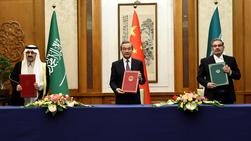 Senior Chinese diplomat Wang Yi (center) attends the closing event of the Beijing dialogue on March 10, 2023, flanked by Musaad bin Mohammed Al-Aiban (left), Saudi national security adviser, and Ali Shamkhani, secretary of Iran's Supreme National Security Council. Saudi Arabia and Iran’s landmark detente offers an opportunity for Iran and other Gulf countries to renew ties and work together on transnational issues from security to climate change, say Middle East experts. (WANG JING / CHINA DAILY)
Senior Chinese diplomat Wang Yi (center) attends the closing event of the Beijing dialogue on March 10, 2023, flanked by Musaad bin Mohammed Al-Aiban (left), Saudi national security adviser, and Ali Shamkhani, secretary of Iran's Supreme National Security Council. Saudi Arabia and Iran’s landmark detente offers an opportunity for Iran and other Gulf countries to renew ties and work together on transnational issues from security to climate change, say Middle East experts. (WANG JING / CHINA DAILY)
Saudi Arabia and Iran’s landmark detente on March 10, which was facilitated by Beijing, offers an opportunity for Iran and other Gulf countries to renew ties and work together on transnational issues from security to climate change, say Middle East experts.
Mohammed Alzghoul, head of the Iranian Research Unit at the Emirates Policy Center, or EPC, a UAE-based think-tank, said that large Middle East powers like Saudi Arabia and Iran repairing ties is a “positive development” that hints at long term reconciliation.
Bahrain, Qatar and Sudan followed Saudi Arabia’s lead and cut ties, while the UAE and Kuwait downgraded diplomatic representations
It creates a favorable environment for resolving issues and promoting mutual growth, he said, as well as raising the possibility of improved relations between Iran and the countries of the Saudi-led Gulf Cooperation Council, or GCC. The GCC comprises Saudi Arabia, Bahrain, Kuwait, United Arab Emirates, Oman, and Qatar.
“Prior to the new agreement, while Iran has benefited from trade relations with some Gulf Arab states, these relations were stalled due to severe tensions between Riyadh and Teheran since 2016,” said Aisha Al-Sarihi, a research fellow at the Middle East Institute at the National University of Singapore.
A successful agreement will not only open avenues for exchange and investment between Iran and Saudi Arabia, but the wider GCC region, she said.
In 2016, Saudi Arabia and Iran severed ties after Riyadh’s execution of a prominent Shia Muslim cleric Nimr al-Nimr sparked widespread demonstrations targeting Saudi diplomatic missions in Iran’s capital, Teheran.
ALSO READ: China praised over Saudi-Iran deal role
Bahrain, Qatar and Sudan followed Saudi Arabia’s lead and cut ties, while the UAE and Kuwait downgraded diplomatic representations.
Ali Khansari, an international affairs analyst and graduate of regional studies at Allameh Tabataba’i University in Teheran, said that Saudi Arabia has always had a “significant influence” on its GCC peers. While they may not always agree with Riyadh, he said, they would “usually coordinate with Saudi Arabia” on their foreign policy toward Iran.
Alzghoul, from the EPC, noted that the UAE has taken steps toward reconciliation with traditional rivals – including Israel, Turkiye, Iran, and Syria – in recent years, while also withdrawing from the ongoing Yemen conflict.
“The UAE leadership recognizes that geopolitical conflicts are zero-sum games, whereas geo-economic competition can result in many ‘winners’, making it a healthier alternative for the region,” said Alzghoul.
Mohammad Salami, an associate researcher at the International Institute for Global Strategic Analysis, or IIGSA, said the detente will definitely strengthen relations between Iran and its Gulf neighbors.
However, he said, challenges remain for Iran and the GCC countries, citing Iran’s involvement in Yemen, Iraq and Lebanon, and “it is unlikely” that these issues will be resolved easily, said Salami.
Still progress is obvious. Mohammad Jamshidi, deputy chief of staff for political affairs to the Iranian president, tweeted on March 19 that Saudi King Salman bin Abdulaziz Al Saud invited Iranian President Ebrahim Raisi to visit Riyadh. Meanwhile, Saudi foreign minister Prince Faisal bin Farhan Al Saud and his Iranian counterpart Hossein Amir-Abdollahian have agreed to meet soon.
READ MORE: Saudi Arabia, Iran agree to restore ties
Henelito Sevilla Jr, a West Asia expert and dean of the Asian Center at the University of the Philippines, said, that “as the leading country of the GCC”, Saudi Arabia’s rapprochement with Iran signals an opportunity for other GCC members to consider collaborating with Iran.
Qatar – which faced diplomatic isolation from 2017 until 2021 after its neighbors accused it of supporting terrorism – restored full diplomatic relations with Iran in 2017, while Oman has maintained a neutral stance but condemned the violence. In August, the UAE and Kuwait named their first ambassadors to Iran in six years.
On March 16, Ali Shamkhani, head of the Supreme National Security Council of Iran, visited the UAE to meet with President Sheikh Mohammed bin Zayed Al Nahyan to discuss enhancing cooperation between the two countries, according to UAE news agency WAM.
Iranian Foreign Ministry spokesperson Nasser Kanaani said that Teheran was also seeking to restore ties with Bahrain.
Sevilla, from the Philippines, said that making peace with Iran is crucial to achieving relative peace in the region.
ALSO READ: China hailed for brokering Saudi-Iranian agreement
“The pre-rapprochement initiative between the two regional powers suggest that in the presence of a highly politicized region and conflicting national interests between parties, confidence building, diplomacy and negotiation are still the best alternatives to confrontation and war,” he added.
Sevilla said that the Arab countries in the GCC no longer see their future solely in terms of strategic relations with the US but also with China. Hence, the successful conclusion of Saudi-Iran rapprochement, mediated by Beijing, “indicate an attempt to diversify their strategic and foreign policy options toward China”.
The acceptance of Beijing’s help was indicative of a diminishing reliance on the US role in determining the future direction of Saudi-Iran relations after years of bitterness, Sevila added.


